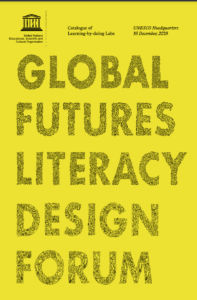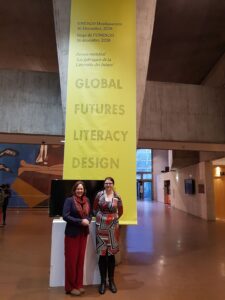Little did I know when I was in Paris at the UNESCO Futures Literacy Forum in December last year, that it was likely to be my last trip abroad for some time. As all of us contend with the onset of the pandemic, and as many parents and carers are trying to figure out how to juggle home schooling and their jobs, it feels almost nostalgic to see this video published of an interview I gave at the Paris event. In it I talk about how storylistening can enable creative imagining about the future, and how it is needed to inform decision making and create futures that exist, and that ‘we’ want to live in. What I said then resonates differently now, of course, as we contend with a pandemic and even at its outset start to think about what the world might look like, what it needs to look like, afterwards.
Tag Archives: futures literacy
UNESCO Global Futures Literacy Design Forum, Paris, December 2019
I’ve just returned from a brilliant experience at the UNESCO Global Futures Literacy Design Forum in Paris. Two days of mind-opening workshops and discussions showcasing the diversity of activities globally that engage with human anticipatory systems and practices. I was involved in delivering two ‘labs’, along with my wonderful postdoctoral research assistant, Olivia Belton, pictured here alongside me. Olivia curated and led a lab developed out of our research project using a collaborative storytelling game to determine anticipatory assumptions about autonomous flight. Olivia led participants through the game she developed on the project, facilitating them to imagine near-future implementations of artificial intelligence. I curated a lab derived from the research for my work-in-progress book with Claire Craig on Storylistening. Whereas futures literacy activities often generate futures, and thereby reveal anticipatory assumptions, through collective storytelling (or other forms of collective imagining), the storylistening lab demonstrated the value to be gained from collective storylistening – that is the activity of listening to and analysing a pre-existing story. Participants worked with Ursula Le Guin’s rich short story ‘The Ones Who Walk Away from Omelas’ to think together about the questions the story raises around forms of governance, the morality of economic models, justifications of utilitarianism and the imaginative (in)ability to countenance alternatives to the status quo. I wrapped up the final day with an evening walk across Paris from the UNESCO site to Gare du Nord, along streets bedecked with Christmas lights and decorations, listening to Christmas music and enjoying the vibrancy of a city which has long been a favourite of mine.


